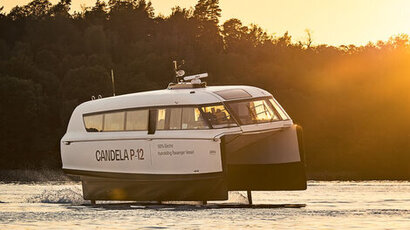
Globally, waterborne transport accounts for 3 percent of greenhouse gas emissions - a challenge Candela aims to tackle with its revolutionary electric hydrofoil technology. This innovation enables operators to switch to sustainable electric vessels, providing shorter travel times, more frequent departures, enhanced comfort, and significantly reduced operational costs compared to traditional ships.
The new $14 million (13 million euro) investment is led by by SEB Private Equity, a global Private Equity investor, with participation of existing investors EQT Ventures and KanDela AB. This brings Candela’s total funding for 2024 to $40 million (or 37 million euros), after a previous round this year.
“This is the dawn of a zero-emission revival in waterborne transportation” said Gustav Hasselskog, Candela’s founder and CEO. “This investment, made during a challenging time for many companies, is a testament to Candela’s technology and its unique ability to solve the pressing issue of decarbonising transport.”
The funding comes as Candela’s order book continues to grow rapidly. Recently, the company introduced the world’s first foiling electric ferry, the Candela P-12, into Stockholm’s public transport system. Here, the P-12 has already demonstrated its ability to halve commute times and showcase the potential to eliminate fossil fuel reliance in Stockholm city's transport, where most emissions come from commuter vessels.
With a service speed of 25 knots, the P-12 is not only the fastest electric vessel in operation globally but also outpaces Stockholm’s diesel fleet. Thanks to a speed exemption due to its low wake signature, the P-12 can travel through the city center at high speed, linking suburbs with the capital.
“We are thrilled to partner with the Candela team” added Anders Jöngard, Investment Director at SEB Private Equity. “We are impressed by Candela’s journey bringing cutting-edge innovation to serial production, including the launch of the world’s first electric hydrofoil ferry. As pioneers in emission-free transportation, Candela is setting new standards. We believe the transition to a fossil-free economy will unlock significant growth opportunities, and we are committed to supporting Candela’s expansion for a more sustainable future.”
Candela’s key innovation lies in its C-Foil, a computer-guided hydrofoil system with underwater wings that lift the hull above the water, reducing energy consumption by 80 percent compared to other high-speed vessels. This enables the rare combination of high speed and long electric range.
Reinforcing its leadership in maritime electrification, Candela recently marked the production of its 100th electric leisure hydrofoil vessel. The company is now aggressively targeting the rapidly expanding global market for electric waterborne transport, which is projected to reach $15.32 billion USD by 2032.
Candela has also secured a contract to bring high-speed electric hydrofoil transport to Lake Tahoe, marking the US debut of its technology. Additionally, the company has closed a fleet deal to electrify water transport for Saudi Arabia’s NEOM project and announced partnerships in Berlin and New Zealand, with more customers to be revealed soon.
The funds will be used to scale up P-12 production at Candela’s Stockholm facility. The P-12’s design, optimised for cost-effective road transport, enables worldwide shipping. Additional production capabilities are also under consideration.
“In every sector, we must move quickly to decarbonise” Gustav Hasselskog. “Our technology offers a strong economic incentive to switch to zero-emission fleets, while unlocking the potential for waterways to ease road congestion. This investment comes at a critical time for the planet.”
For additional information:

